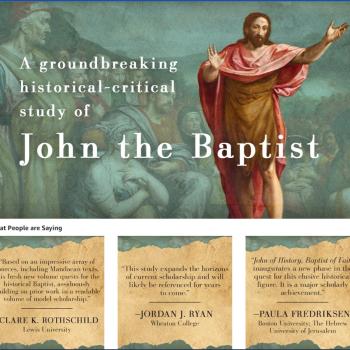Richard Carrier has written a characteristically-long blog post which ends with the following sentence: “But alas, when people make false claims about our work and straw man our arguments in an effort to malign our competence, sometimes we have to pay at least the respect of exposing what they’ve done.”
The post also mentions a “McGrath” who I assume is me, and he writes this:
If he was fabricating, he would invent a prophesy that said Jesus would be a “Nazaretos.” Clearly, Matthew was stuck with a prophesy that didn’t quite match the town, but he ran with it anyway. That all but entails he wasn’t lying. He was reading a scripture (or scripture variant) we no longer have (of which we know there were many, something McGrath embarrassingly isn’t aware of, and now Brown repeats that same ignorance–by trusting McGrath to have told him this).
What a bizarre accusation – or perhaps I should call it what it is, not so much an accusation as an insult. I'm not aware that there are texts we don't have? Is he serious? Or is he criticizing me for preferring to answer historical questions using data we have, rather than assuming the picture would be different if we had sources that we don't, which said things extant sources do not?
How can someone write something so insulting, and then conclude their post as Carrier concludes his? Is he really not able to see that he does they very thing that he says one ought not to? When we actually know the names of some sources that are no longer extant, and my view of the interrelationship of the Synoptic Gospels posits a source that no longer exists, how could Carrier think that a remark like that would do anything other than make him sound like a careless internet apologist?
For those who may be interested, in a conference paper I gave on Matthew's non-existent prophecy, I suggested that Nazoraios was an already-existing term (that seems more likely than that the Mandaeans who dislike Jesus adopted it from Christians), and that Matthew is responding to claims that Jesus was a Nazoraios by trying to reinterpret the term as meaning someone from Nazareth, rather than denoting a particular religious category.
Whether the term designated someone skilled in magic, a proto-Mandaean member of a baptizing movement, a Gnostic, some combination of the above, or something else, is something that it is difficult to answer with any confidence, and so I won't try to tackle that here. I really ought to find the time to turn that SBL conference paper into an article, and not just keep it for a book I hope eventually to write on the relationship between the New Testament and Mandaean literature.
Carrier's post is a response to Kevin Brown's multi-post review, which I mentioned on this blog previously.













